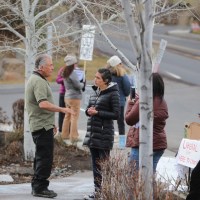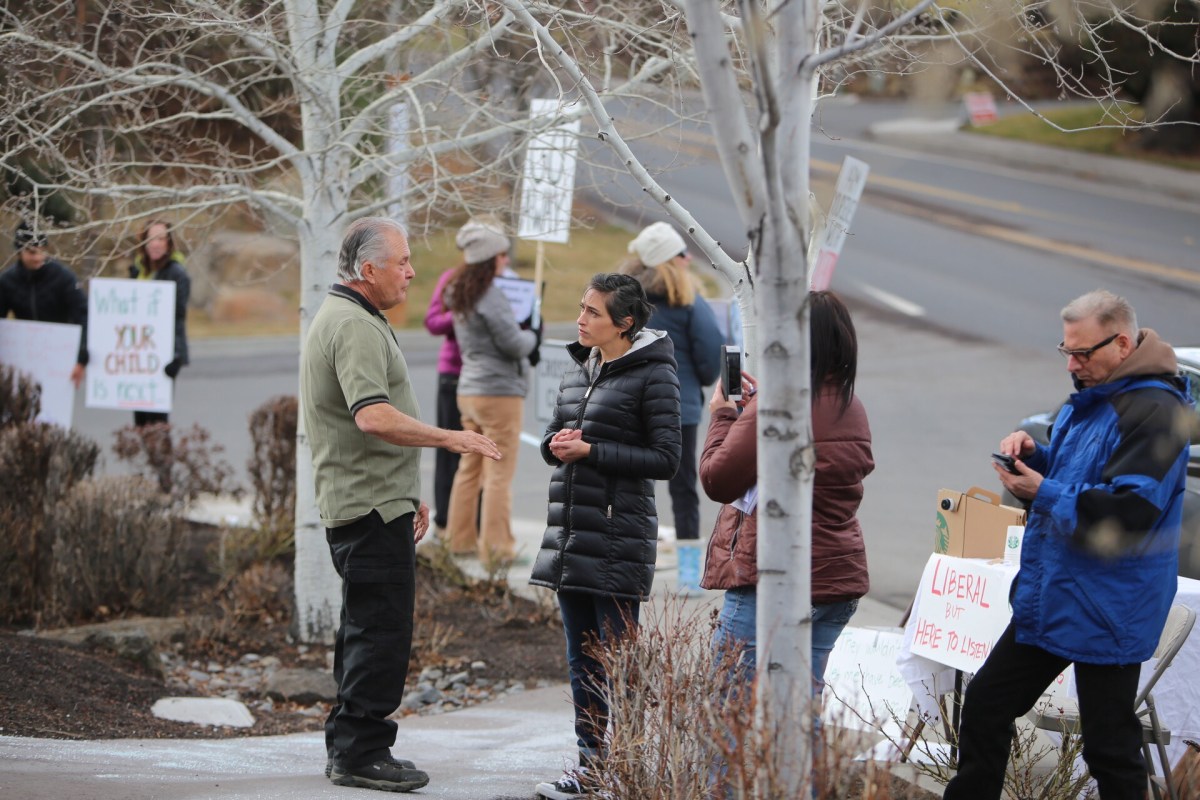I was running late. I was supposed to be doing some peacemaking at an NRA event, but I was so nervous about it that I put off leaving my house for as long as possible.
Trying to have empathetic conversations with members of the NRA while they were being actively protested seemed like a good idea when I came up with it. But when it came time to leave my house and actually do it, I hesitated. Between all the polarization around gun control and the fact that the NRA members would likely be armed, my stomach churned at how badly it could go.
Which is why, 15 minutes after the protest had officially started, I was still at Starbucks waiting for the box of to-go coffee I had ordered. I got decaf because that’s what I wanted… and because if no one wanted to talk to me, at least I would have coffee.
I was full of contingencies. And delay tactics.
When I finally pulled up, there were about 15 protesters on the corner loudly demonstrating their opposition to the NRA. Despite the chilly 37-degree weather, they were energized and empowered. Passing cars honked in drive-by solidarity, and every beep elicited a cheer from the group.
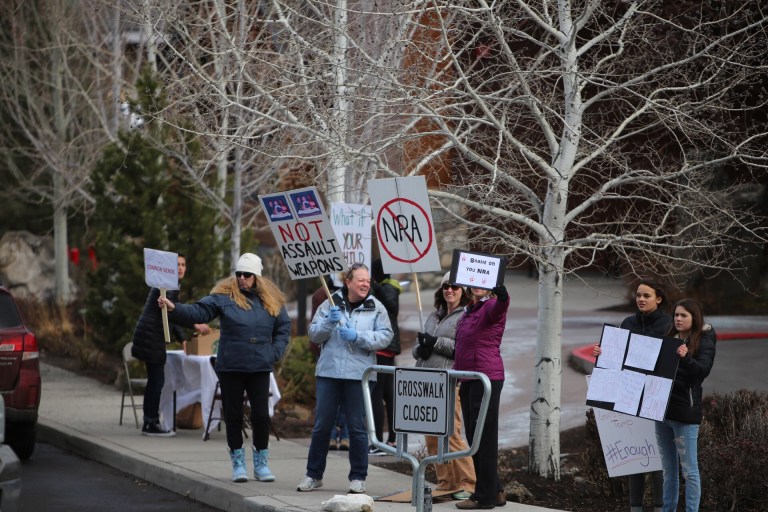
When I approached, they turned to me in happy anticipation of adding to their numbers. But their smiles slowly faded when I explained that I was there to talk to people—to listen and understand, not to protest. I wanted to understand why people believed the things they believe.
“But you’re with us, right?” the organizer asked.
It was a loaded question. She needed me to pick: us or them. I wanted to shout, “I pick all of us!” and spin around like Julie Andrews in Sound of Music. But I decided that would be counterproductive. She was clearly asking about my politics, so I agreed, “Yes, I’m with you.”
She explained that she’d already told the police department her group wasn’t going to engage with them, and therefore I should abandon my idea and join their protest. But I wasn’t going to give up that easily.
“Ok, that’s fine. You don’t have to engage.” I told her with a smile.
She switched tactics, “It’s not going to work. They don’t want to have a conversation. They’re hostile.”
“Ok. Thanks. I’m going to try anyway. I tend to have good luck with people.” Smile.
She was less excited about me now, and the feeling seemed to spread among her fellow protesters. They told me if I was going to engage, I needed to set up down the sidewalk, a good distance away from them.
I tried to not let the rejection get me down as my husband and I set up our table. By default, we were now directly in between the protesters and the NRA event. If my husband hadn’t been there, I would’ve felt completely alone. No, wait… I would’ve been completely alone.
“This is never going to work. No one likes a peacemaker,” my mind unhelpfully told me as I made my signs.
I ignored it and refocused on my signs. “Unity starts with listening,” I wrote. And, in an effort to build a bridge, I used language that my conservative friends tend to use: “Liberal, but here to listen.” I don’t consider myself “liberal,” but my friends on the right have described me that way… and that’s probably the word I would’ve used for people like me before my politics changed.
As I was taping up my last sign, a man walked up behind me demanding to know, “Why are you here???”
I turned around and found myself face to face with a man with a weathered face, gray hair, and (despite the frigid temperatures) a t-shirt. He didn’t seem like the kind of person you should mess with, which made me glad that I wasn’t there to mess with him.
“I’m here to listen and try to see things from your perspective,” I told him with a smile.
There was a long pause. He cocked his head back, furrowed his brow, and looked me in the eye. “You’re sh***ing me,” he said. “No one does that.” It was stated as a fact.
“I know!” I laughed, “but I do!”
Still not convinced, he took a couple of steps toward me and launched into a tirade demanding to know what I’d do if someone attacked me or my children and I didn’t have a gun. “You know what you’d do?!? You’d DIE,” he said, pointing a finger at me.
He clearly thought we were enemies. There was no doubt in his mind. I held up both hands, took a slow step forward, and called a timeout.
“Hold on,” I said. I looked him in the eye and smiled, “I haven’t said anything about my position on guns, and I’m not here to argue or change your mind. I really, honestly just want to listen and understand your perspective.”
I held out my hand, “I’m Courtney and this is my husband Gary. What’s your name?”
He shook my hand and told me his name was Johnny. “So, Johnny, why do you support the NRA Foundation?” I asked, genuinely curious and careful not to cross my arms or close myself off.
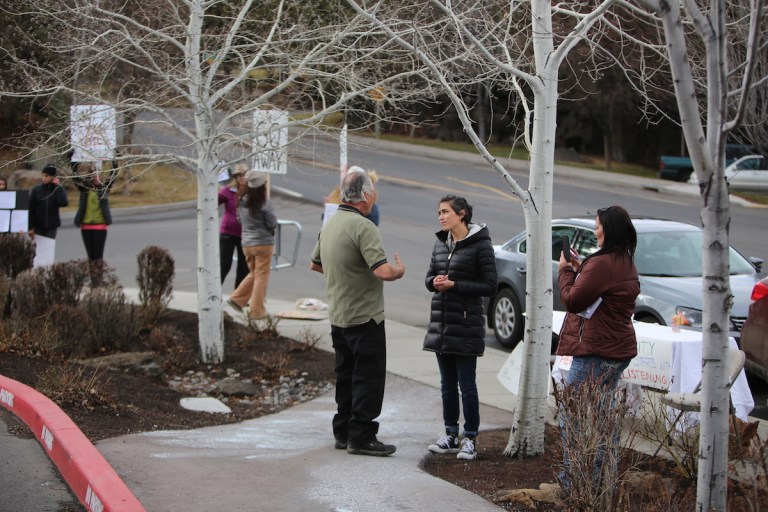
He shifted on his feet and his entire demeanor changed. He looked slightly confused, but he leaned into the conversation and explained why he was passionate about personal freedom and gun rights. (He’s concerned that without a gun he wouldn’t be able to protect his family or property. In his mind, our horrific treatment of Native Americans proves that if you can’t protect yourself in this country, everything will be taken from you.)
I mindfully practiced active listening and repeated his perspective back to him—which not only helped him feel heard, but also helped clarify that I wasn’t necessarily agreeing or affirming his position.
I asked some hard questions about regulations, risk, freedom, and what makes America great. He gave some answers that I completely agreed with and some that I REALLY wanted to argue with. But I didn’t argue. I just listened.
It was hard, but I think it was worth it because he walked away 10 minutes later knowing that holding opposing political views doesn’t have to make us enemies. Being enemies is a choice, and we can choose differently.
And if we’re not enemies, it opens up the possibility that we can work together toward a common goal and all win.
My conversation with Johnny was repeated with the other people I talked to that day. They started out assuming we were enemies and they were completely disoriented when I refused to act like we were. The fact that I didn’t hate them and had no interest in winning the conversation shocked them.
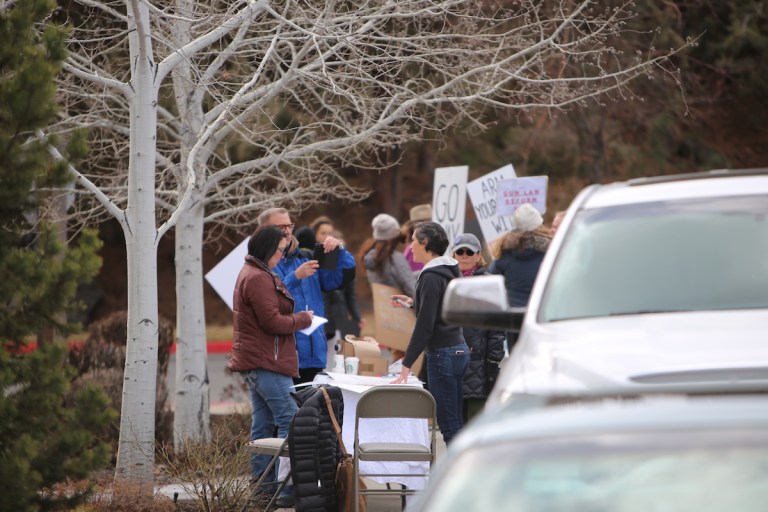
They all assumed that I had demonized them and therefore, they demonized me in return.
In their minds, I was nothing more than an angry liberal who wanted to take away their guns. But when they looked me in the eye and saw that I truly cared about them, wanted to know them, and didn’t see them as my enemy, it un-demonized me in their eyes. When I loved them and treated them like a human, they did the same to me.
We can’t make progress while we’re demonizing each other. Demonizing simply justifies our anger and violence toward one another—because if someone is a monster, the right thing to do is destroy them. But if they’re human, the right thing to do is to love them. 
Someone has to be the first to un-demonize the other by choosing to love anyway. When I took that step, when I assumed the best in those I disagree with and chose to love them despite our differences, it freed them to do the same toward me.
Once we erased the lines we’d drawn in the sand, we were just two people, having a conversation, trying to understand each other.
That is the foundation on which peace can be made. Without it, we’re just taking a stand. We’re not creating change.
The truth is that peace and unity don’t appear out of nowhere, all at once. They grow slowly, like a tree from a seed. But they have to start somewhere—with one person, one conversation. It starts by taking one small step toward the other, instead of away from them. And if we follow that step with another, and another, they will lead us into a posture of listening, and eventually to love.
It can start with anyone. So why not me? Why not you?
Peacemaker Friday is published weekly to share stories of people unmaking violence around the world. Be inspired. Take Action.
Photos and video by Gary A. Christenson

